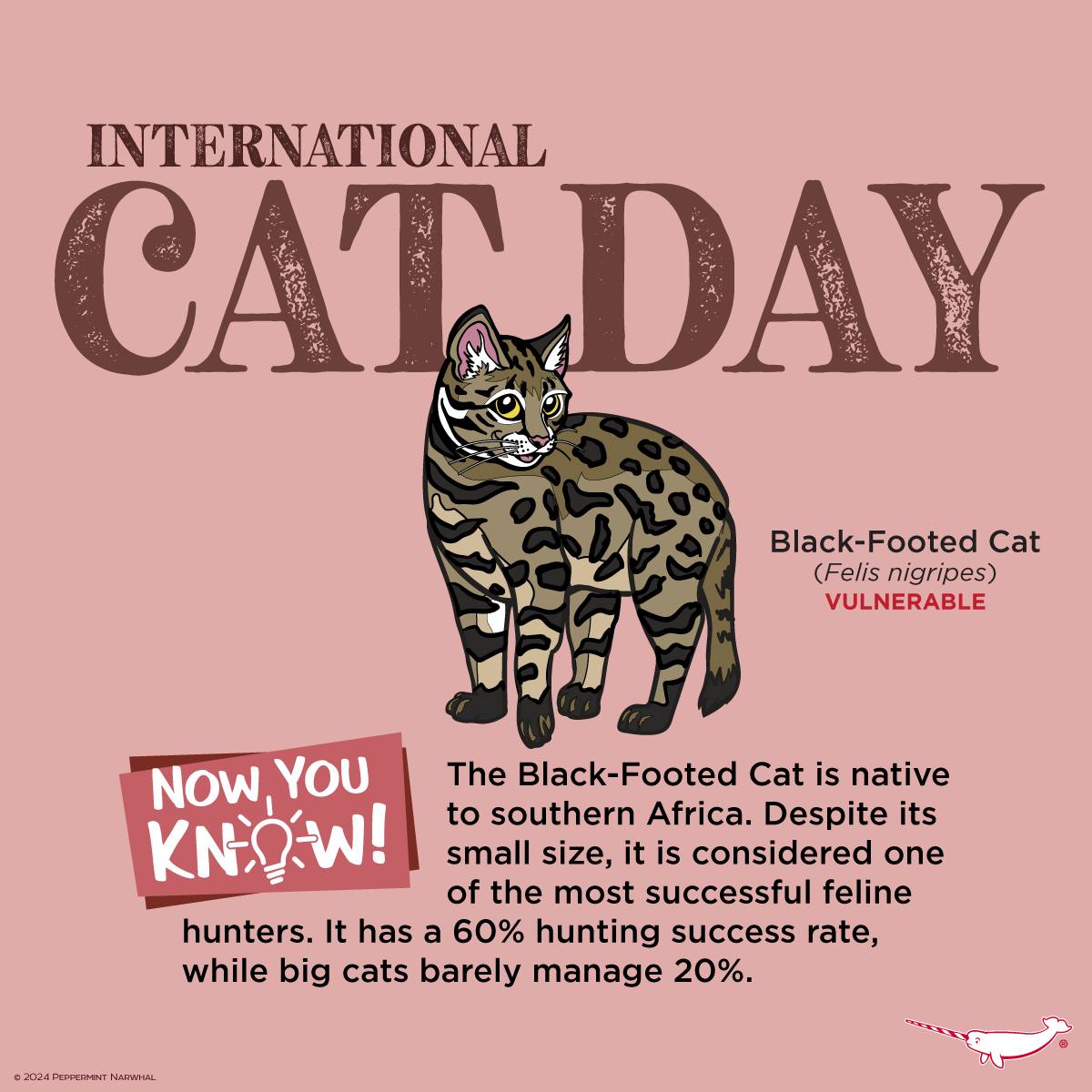- Origins and Habitat
- Physical Characteristics and Behavior
- Hunting and Feeding Habits
- Conservation Status and Efforts
- Recognizing International Cat Day
The black-footed cat (Felis nigripes) merits a spotlight on International Cat Day due to its unique characteristics and notable hunting prowess. Native to the arid regions of southern Africa, this species has adapted to thrive in some of the most challenging environments on Earth. Although small in size, the black-footed cat is powerful and efficient, with a hunting success rate that far exceeds that of many larger felines.
Origins and Habitat
Felis nigripes is indigenous to the arid regions of Botswana, Namibia, and South Africa. This habitat is primarily composed of savannas, semi-deserts, and grasslands. These cats are well-suited to areas with sparse vegetation, offering both cover and a rich supply of prey. Unlike other feline species that might prefer lush, dense forests, the black-footed cat has adapted to live in open, arid regions.
These cats dig burrows for shelter or, more often, occupy abandoned burrows of aardvarks, porcupines, or springhares. The burrows provide protection against predators and extreme weather conditions. The survival of this species in such inhospitable regions underscores their adaptability and resilience.
Physical Characteristics and Behavior
At first glance, one might mistake the black-footed cat for a domestic kitten due to its small stature. Adults typically weigh between 2 to 6 pounds and measure around 14 to 20 inches in length, excluding their tail. The fur of this species is a striking mix of pale brown to dark russet, dotted with black spots and stripes, providing effective camouflage in their native habitats.
Behaviorally, black-footed cats are solitary and predominantly nocturnal. They are known for their secretive nature, seldom seen even in their native range. Their activity peaks after sunset as they embark on their hunting expeditions. Due to their solitary lifestyle, encounters between individuals are rare outside of the mating season. When these cats do meet, it’s typically fleeting and without much interaction, underscoring their solitary tendencies.
Hunting and Feeding Habits
The black-footed cat’s hunting success rate is an impressive 60%, making it one of the most efficient predators within the feline family. In comparison, the hunting success rate of much larger felines, like lions, hovers around 20%. This small but formidable hunter employs a combination of stealth, speed, and agility to capture prey.
Their diet is diverse, primarily consisting of small mammals, birds, reptiles, and insects. Utilizing their acute sense of hearing and sharp vision, these cats are adept at detecting prey even in low light conditions. When hunting, they rely on a series of short, rapid movements, combined with patience and precision to successfully capture their target.
Another remarkable aspect of their hunting behavior is their ability to consume up to one-sixth of their body weight in one night. Given their small size, this means they need to hunt frequently to maintain their high metabolism and energy levels.
Conservation Status and Efforts
The black-footed cat is classified as Vulnerable on the International Union for Conservation of Nature (IUCN) Red List. The primary threats to their survival include habitat destruction, human encroachment, and a decreasing prey base. Additionally, inadvertent poisoning from rodenticides intended for pest control also poses a significant risk.
Conservation efforts are underway to protect this elusive species. Various wildlife organizations focus on habitat preservation, anti-poaching measures, and public education to raise awareness about the black-footed cat’s plight. In recent years, there have been successful campaigns to limit the use of harmful pesticides and promote biodiversity in their native regions to ensure a stable prey population.
Recognizing International Cat Day
International Cat Day, celebrated globally on August 8th, provides an excellent platform to spotlight lesser-known yet fascinating feline species like the black-footed cat. This day encourages cat lovers and conservationists alike to appreciate the diversity and complexities of the feline world. It offers an opportunity to educate and inform the public about the conservation status and unique adaptations of these animals.
On this day, awareness campaigns, social media posts, and educational events highlight the importance of feline conservation. Organizations like Peppermint Narwhal contribute to this cause by promoting feline-themed merchandise and raising funds for conservation projects. The inclusion of the black-footed cat in their Wild Cat pin series is a commendable effort to draw attention to this incredible species and support ongoing conservation efforts.
International Cat Day serves as a crucial reminder of the beauty and wonder of the feline species, from domesticated pets to wild counterparts like the black-footed cat. It underscores the necessity of continued and enhanced conservation efforts to protect these animals from the numerous threats they face in the wild.
Engaging with and supporting conservation organizations during International Cat Day can make a significant difference in the survival of endangered species like the black-footed cat. Every effort, no matter how small, contributes to a larger movement aimed at preserving biodiversity and fostering a sustainable future for all feline species.
*****
Source Description
Happy International Cat Day!
Now You Know! – The Black-Footed Cat (Felis nigripes) is native to southern Africa. Despite its small size, it is considered one�of the most successful feline hunters. It has a 60% hunting success rate, while big cats barely manage 20%.
We are considering adding a new feline species to our Wild Cat pin series. If you would like to see the Black-Footed Cat join that collection then please give this graphic a LOVE. You can also feel free to suggest other feline species you would want me to consider by posting your suggestions in the comments.
Cat Merch: www.peppermintnarwhal.com/s/search?q=cat
and for More Great Animal Merch….
Shop www.peppermintnarwhal.com
International Shoppers visit our store on Etsy:
www.etsy.com/shop/PeppermintNarwhal

